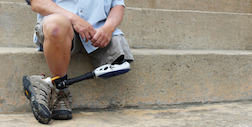 According to the complaint filed by Michael R. Wilkinson in a New Jersey state court this past December, the plaintiff was prescribed Invokana (canagliflozin) to help manage his diabetes. He started on the drug in April, 2015. However eight months later, in December of that year, Wilkinson was compelled to undergo a partial amputation of his right leg below the knee. He continued to use Invokana until May 2017, unaware that the drug may have triggered various health events that culminated in the partial loss of his right leg.
According to the complaint filed by Michael R. Wilkinson in a New Jersey state court this past December, the plaintiff was prescribed Invokana (canagliflozin) to help manage his diabetes. He started on the drug in April, 2015. However eight months later, in December of that year, Wilkinson was compelled to undergo a partial amputation of his right leg below the knee. He continued to use Invokana until May 2017, unaware that the drug may have triggered various health events that culminated in the partial loss of his right leg.Plaintiff lost his part of his right leg eight months after starting on Invokana
It was when recent warnings about Invokana and the association with various Invokana adverse events – including diabetic ketoacidosis – that prompted the plaintiff to switch to an alternate medication, and consider legal action.
According to Court documents Invokana arrived on the market in 2013 – about two years before Wilkinson started on the drug – as part of a new class of medications designed to help manage diabetes. The class is known as sodium-glucose cotransporter 2 (SGLT2) inhibitors, medications that differ from the normal function of diabetes medications by directly impacting certain kidney functions. Other drugs in the class include Farxiga (dapagliflozin), Glyxambi (empagliflozin/linagliptin), Invokamet (canagliflozin/metformin), Jardiance (empagliflozin), and Xigduo XR (dapagliflozin/metformin).
Doctors began switching many of their patients over to the SGLT2 inhibitor class, with Wilkinson starting on Invokana two years and one-month after canagliflozin was first approved for the market by the federal drug and medical device regulator, the US Food and Drug Administration (FDA).
However, almost immediately the FDA began to receive adverse events reports from post-marketing studies and other experiential reports from patients, and in December 2015 – the same month that Wilkinson lost his right leg below the knee – the FDA began issuing warnings and required label updates for the SGLT2 class, including Invokana.
The first referenced cautions with regard to diabetic ketoacidosis, a serious condition related to the kidney that can jeopardize normal kidney function and result in life-threatening injury.
Six months later, the FDA was back with even more compelling warnings with regard to SGLT2 inhibitor drugs, as well as Invokana side effects. This was followed, in May 2017 with a warning update regarding the potential for amputation risk of the leg and foot associated with Invokana.
Plaintiff feels manufacturers should have known the risks, and should have warned patients sooner
READ MORE INVOKANA LEGAL NEWS
“Defendants knew or should have known the risks associated with the use of Invokana, including the risk of amputation,” Wilkinson’s lawsuit states. “Plaintiff Michael R. Wilkinson’s injuries were a reasonably foreseeable consequence of Defendant’s conduct and Invokana’s defects.”
The case is Michel R. Wilkinson v. Janssen Pharmaceuticals, Inc. and Johnson & Johnson Co., Case No. MID-L-007338-17, filed December 13, 2017 in the Superior Court of New Jersey, Law Division, Middlesex County.
